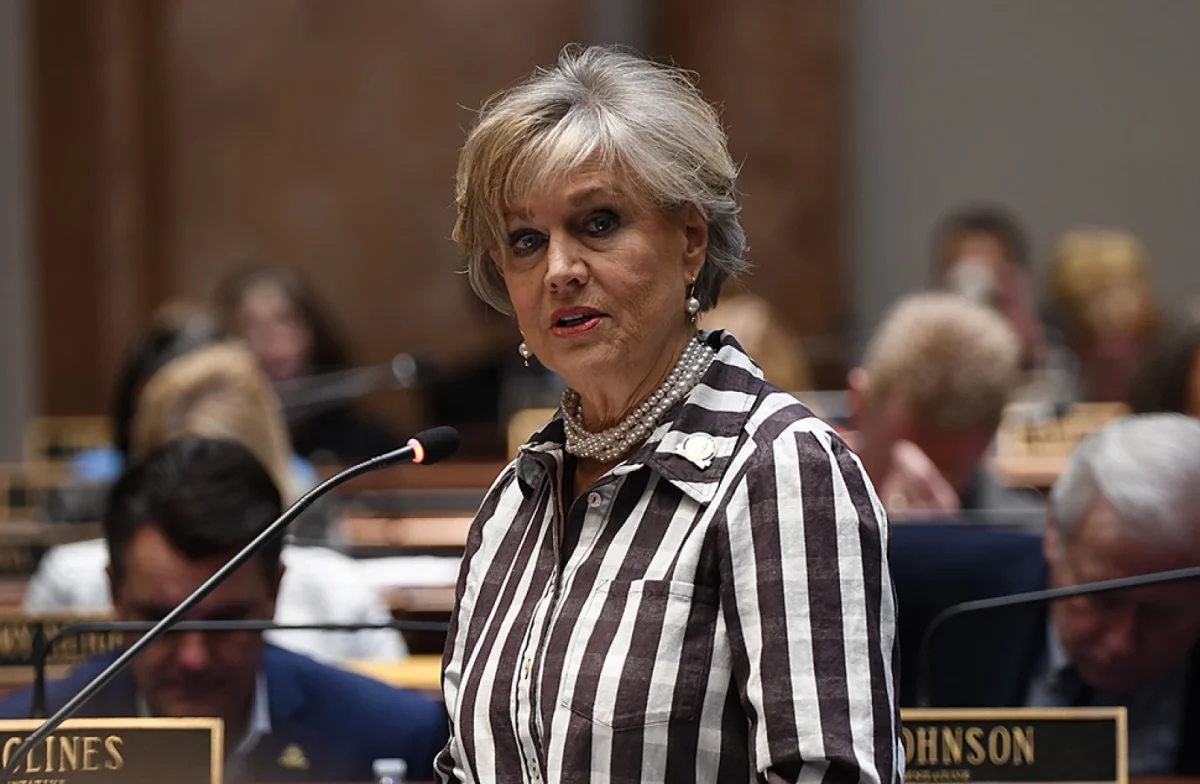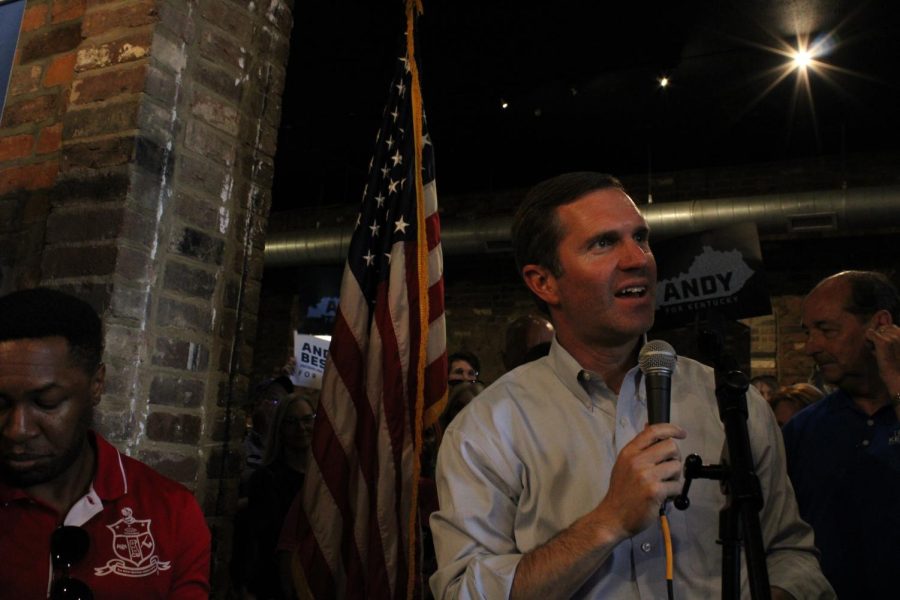Under Senate and House bills introduced to the Kentucky General Assembly in January, all “discriminatory concepts” and all Diversity, Equity and Inclusion initiatives would be banned from public universities in the state.
This legislation comes as similar bills have become law across the country in states like Tennessee and Florida, the two states from where the DEI bills draw their inspiration.
“Discriminatory concepts” is defined in Senate Bill 6 to include ideas that imply the inherent superiority of a race or sex, inherent privilege due to race or sex and promote division between groups of people. The bill states students or employees shall not receive adverse treatment for refusing to support any discriminatory concepts.
SB 6 was introduced on Jan. 2 and is sponsored by Sen. Mike Wilson, R-Bowling Green, and passed on a party-line vote at the Senate Education Committee session on Thursday, Feb. 8. The bill was debated and voted on by the full Senate on Feb. 13 and passed by a vote of 26-7, with five senators not present. The bill will now move to the House for consideration.
Senators Wilson, Max Wise and David Givens, who together represent Bowling Green and Warren County, voted in favor of the bill.
At the Senate Education Committee hearing, Wilson said the bill will protect students, faculty and staff who “face a shifting, stifling, politically correct academic atmosphere.”
With this bill, public universities in Kentucky could not require mandatory training that presents “discriminatory concepts,” provide preferential or prejudicial treatment to an individual based on ideology or require courses that could present discriminatory concepts.
A similar bill, House Bill 9, would require every Kentucky public university to defund all DEI efforts, including trainings, offices, staff positions and promotion or justification of “discriminatory concepts.”
Presidents and leadership of Kentucky’s public universities have largely remained silent on the proposed legislation. The only president who has spoken out on the bills is University of Kentucky President Eli Capilouto.
In an email sent to UK faculty, staff and students, Capilouto wrote that “We don’t speak as an institution on public policy unless the issues will impact our entire community in potentially significant ways. This is one of those moments.”
“As the University of Kentucky’s president, let me be clear: I am opposed to the legislation regarding both DEI and tenure,” Capilouto continued. “I have voiced my stance in a manner that I hope is respectful and thoughtful. I will continue to do so.”
In his statement, Capilouto expressed UK’s commitment to valuing and supporting DEI work in order to “support students of color and from underrepresented backgrounds.”
Presidents from Kentucky’s seven other public universities have not expressed a positive or negative view on the legislation, but some have expressed support for DEI initiatives and programs.
Murray State University President Bob Jackson and University of Louisville President Kim Schatzel, while not speaking out explicitly on the bills like Capilouto, have expressed their support for DEI initiatives at their respective institutions.
“Creating a dynamic and diverse university community for Student Success is a cornerstone of our university-affirmed strategic plan,” Jackson told the Murray State News. “Within our strategic attributes as a public comprehensive university, we are dedicated to diversity, global awareness and intellectual curiosity and we actively engage students, faculty, staff and the community in collaborative scholarship, creative activity and research.”
“I strongly believe that you cannot deliver a high-quality university education without a diverse classroom and campus – inclusive of all demographics, identities and ideologies,” Schatzel said in a statement published in full in the Louisville Cardinal. “Only in such circumstances and with such experiences will our students be prepared to foster their own and others’ excellence in a diverse global economy. In short, a diverse and inclusive campus better prepares our students to lead.”
Schatzel continued, stating that she “strongly endorse(s) continued support for DEI initiatives on our campus throughout Kentucky.”
When meeting with the Herald on Jan. 10, WKU President Timothy Caboni said that it is his goal to ensure every student feels supported and at home at the university, but offered no opinion on SB 6. HB 9 had not yet been introduced at the time of the meeting.
“Our focus is ensuring every student, no matter their background, is supported,” Caboni said. “There are concerns around ideology, and what I would say to my legislative colleagues is all our work at WKU is around one thing: ensuring that every student we admit is supported and gets to a college degree, no matter their background.”
On Feb. 21, the Herald requested an interview with Caboni to see if WKU has a stance on the legislation. Jace Lux, university spokesperson, expressed WKU’s policy to track proposed legislation that could affect higher education in the state, and stated that Caboni has engaged with “approximately 30 legislators” to discuss these bills and other proposed legislation.
“President Caboni is actively involved in direct, ongoing discussions with lawmakers to address any legislative actions that could influence our university’s operations, ensuring that our perspective is considered during their decision-making processes,” Lux stated via email.
Lux also provided a statement on WKU as a campus that fosters open, respectful discussions, similar to the comments of Jackson and Schatzel.
“Our commitment to ensuring that WKU remains a secure and inviting place for everyone who studies, works, visits or competes here remains unwavering,” Lux stated. “We are dedicated to fostering an environment for the campus community to participate in open and respectful discussions. We consistently oppose any actions that might restrict our foundational belief in the free exchange of ideas.”
In an amendment to SB 6 at the committee hearing, all Kentucky public universities would be required to adopt policies that ensure “the fundamental and constitutional right of all students and faculty to freedom of expression,” “the broadest possible latitude to speak, write, listen, challenge, learn, and discuss any issue” and a commitment to a free, unsuppressed exchange of ideas regardless of content.
Changes were also made to require content and discussion of the importance of free speech at all student college orientations.
Various speakers at the hearing presented both in support of and against the bill. Rebecca Keith, a student at the University of Kentucky, spoke in support of the bill on her experience at the university.
“You will bend a knee to DEI at UK,” Keith said. She explained that when her professor said homophobic, transphobic and islamophobic language was not allowed in the course, “as someone who believes there are two genders and that men cannot become women, this was problematic to me.”
Aaron Thompson, president of the Kentucky Council on Postsecondary Education, spoke against the bill at the hearing, stating what he believes Diversity, Equity and Inclusion truly is – that it is not discriminatory.
“If you have ever felt discriminated against at one of our universities, that should’ve never happened,” Thompson said. “That’s not what DEI is.”
HB 9 is sponsored by Rep. Jennifer Decker, R-Waddy, who stated in a press release shared on Facebook that the bill would “make our campuses more diverse, less expensive, and more tolerant of a free exchange of ideas.”
The bill has five pages of definitions, including the definition of “DEI initiatives” as “Policies, practices, or procedures designed or implemented to promote or provide differential treatment or benefits to individuals on the basis of religion, race, sex, color, or national origin.”
If passed, universities must eliminate these initiatives, which include scholarship criteria, living-learning programs, student services, community services or “other initiatives designed to promote discriminatory concepts or to provide differential treatment or benefits to an individual on the basis of race, sex, color or national origin.” DEI offices and officer positions must also be eliminated.
“HB 9 would ensure the postsecondary system in Kentucky is held accountable to dismantle the failed and misguided DEI bureaucracies that have made college more divided, more expensive, and less tolerant,” Decker said in the press release.
The bill also states that universities shall not require or encourage individuals to endorse or condemn ideologies and not provide preferential treatment or consideration to individuals based on actual or perceived ideologies. Institutions must also add a clause on “ideological neutrality” to the institution’s nondiscrimination policy.
However, the section of the bill calling for the removal of DEI efforts and “discriminatory concepts” will not affect things such as academic freedom of faculty, students and student organizations and activities of student-led organizations, according to a section of the bill. It will also not affect students that are military veterans, first-generation, low income or non-traditional.
Impact on WKU
It is unclear exactly how HB 9 and SB 6 will impact Kentucky’s universities. WKU faculty have differing opinions on how these bills could impact the work they and the university do.
Gary Houchens, WKU professor in the school of leadership and professional studies and director of the educational leadership doctoral program, explained that SB 6 would ensure students, faculty and staff at public universities cannot be forced to agree with a certain set of concepts.
“I think both bills are rooted in a concern that our public universities, private universities too, higher education in general, have become intellectual, ideological monoliths,” Houchens said. “We the university should be a place where we have the most rigorous debate of ideas possible. And that is simply not the case. The goal here, as I understand it, is to reassert that universities should be places where a wide variety of intellectual concepts are welcome to be discussed.”
He further said that SB 6 simply ensures certain intellectual, social or political concepts cannot be forced on students, faculty or staff, and that it would benefit free speech and support of different viewpoints.
“What I would say to anyone who opposes Senate Bill six is, if you oppose this bill, which of these concepts do you think that you should be able to force a student or a staff member or a faculty member to affirm?” Houchens said. “The burden of proof is on those who oppose Senate Bill six for why they think there shouldn’t be that kind of protection against being required to affirm these concepts.”
Houchens explained this bill would “change nothing” about how he teaches his classes, and that it shouldn’t impact any faculty or courses unless they try to compel students or colleagues to affirm discriminatory concepts. He also said this bill would not change or affect curriculum.
“We’re supposed to be an institution that embraces intellectual debate and diversity and that’s simply not what universities have become,” Houchens said. “And so, hopefully, the outcome of this would be that our universities become places where it is, once again, safer to express a wide variety of philosophical and political viewpoints.”
However, Houchens stressed the differences between SB 6 and HB 9, saying that HB 9 “goes about and beyond” what SB 6 would do and would actively limit certain concepts and diversity initiatives.
“I think that’s a mistake,” Houchens said about HB 9. “I think that the consequences of that particular bill, I think there would be negative unintended consequences of that bill for the life and the culture of our universities.”
He said it is important to still recognize the concerns at the heart of HB 9, which is that even well-intentioned DEI efforts in some universities have “become tools through which the free expression of ideas has been restricted.” Houchens said it would be a good thing if HB 9 didn’t pass, but it should still serve as a “wake-up call.”
Both bills reflect the desire from across the country that universities should better protect and value free speech. Houchens said while he hasn’t faced any professional backlash at WKU for being a “public conservative,” he knows of students and job applicants that have. Therefore, he said it is a fact that people engage in constant self-censorship, and shows a need for a “more robust environment of political discussion.”
“Whatever comes out of these bills, I hope that they serve as a wake up call to the university community, that we have an obligation to make this a place where a great diversity of intellectual viewpoints are welcomed, and that we recognize that within our university, students, staff, even some faculty members share a multitude of different perspectives …,” Houchens said. “My hope is that the university would be a place where there is a recognition that people of goodwill can disagree about a lot of different viewpoints, and that that’s a good thing.”
Some education professionals have expressed concerns about the negative impacts of HB 9 and SB 6.
Saundra Ardrey, WKU professor of political science and chair of the WKU Political Engagement Project, said not discussing “divisive” issues only leads to a further lack of understanding and acceptance. As an educator, she believes school is the place to discuss the intricacies of these concepts, especially at the college level.
“There are a lot of folks that believe that the more you talk about it, the more it stays in folks’ consciousness, but many of us who are living that marginalized life, those of us in education, believe that the key to solving these issues is to talk about it,” Ardrey said. “And the reason that we continue to be divisive is that we don’t understand, and what we don’t understand, we tend to otherize.”
She said the purpose of this education is to show students systemic issues and how certain groups are affected.
“I am a big believer in the power of education. Not necessarily to change anybody’s mind, but at least expose you to what others are thinking,” Ardrey said. “And if I can become human in your eyes, that is the first step, to help you understand that I’m not here, that we’re not here, to take anything away. We’re not saying that you didn’t work as hard for what you’ve gotten. But we are saying that the system and the way we think of people, privilege some people, and that the system has actively worked against certain groups according to race and gender and religion and all of those, and so we want a safe space to educate.”
Ardrey acknowledged that there are students who go through these classes that feel blamed for racism of the past, but that in general, students appreciate having a space to talk about sensitive issues and to have a dialogue with those who are different than themselves.
“So yes, there are those who don’t yet get it. And there are those who will get it later,” Ardrey said. “But my marginalized students really appreciate a safe space to talk about it. I mean, everybody that feels marginalized appreciate having a space to talk about it, you know, so I think that’s a big benefit.”
She said she would hate to see these beneficial spaces go away, especially for students who need them.
“For the most part students appreciate what we do in the class as an open environment,” Ardrey continued. “And sometimes it takes a year or two before they can look back and say ‘I appreciate that conversation. I appreciate that space.’”
Ardrey said the bills present uncertainties as to whether certain majors, programs and classes could continue at WKU and on college campuses across Kentucky. These include the African American Studies and Gender and Women’s Studies programs, organizations like the Intercultural Student Engagement Center and the Pride Center and classes that Ardrey teaches like Women in Politics, Minority Politics and Cultural Competency. She expressed that these classes, programs and organizations could simply go away, but it is currently unclear.
“We just don’t know,” Ardrey said. “We’re in uncharted territory. We just don’t know.”
The uncertainty of what content and concepts they would be able to teach is frightening for many other faculty members, she explained. She said recruiting faculty members will be difficult if either of the bills pass, specifically for her position and the courses she teaches, since she is retiring this semester.
“Since I’ve been so outspoken, faculty are emailing me and saying, you know, what does this mean for what I teach? What can I say in the classroom? What can’t I say in the classroom? So folks that are already here are scared,” Ardrey said.
For Ardrey, who is retiring at the end of the current semester, leaving WKU on this note is “disheartening” and “sad” for her, and she expressed that it feels as if higher education in the state is going backwards.
“These are battles that we have to fight now to save where we [have] come, and we can’t push forward. We can’t progress,” she said.
These fears and dissatisfaction with this legislation were expressed by other WKU faculty and staff at a forum hosted in Cherry Hall by the WKU Political Engagement Project on Feb. 8.
“There’s one way where this bill will achieve its goal, which is that as a faculty member of this university, I cannot ethically look any high school student in the face and say ‘come to a university in Kentucky’ regardless of that individual’s ‘race, religion, color, sex or national origin,’” Alan White, assistant professor and theater program coordinator, said. “Because I don’t feel like this allows us to make any student feel safe.”
At this forum, the vagueness of the bills and the statements from their sponsors led to confusion as to what programs would be impacted by this legislation, should it pass.
“Chances are, they [the bill’s sponsors] don’t even know [what the bills will do],” Cierra Waller, associate director for student success at the WKU Center for Innovative Teaching and Learning and member of the Bowling Green Independent Schools Board of Education, said.
The forum’s panelists urged attendees to contact their local legislators to express their feelings on the bills, whether individuals are for or against the legislation.
“So that is my plea. If you have questions, contact your folks,” Waller said.
Should the bills pass, they will go into effect on June 1, 2024.
Editor-in-Chief Alexandria Anderson can be reached at [email protected].
Commentary Editor Price Wilborn can be reached at [email protected]. Follow him on X @pricewilborn.
If you would like to submit a reaction to a piece, Letter to the Editor or other submission, please send it to Commentary Editor Price Wilborn at [email protected] or [email protected].






















